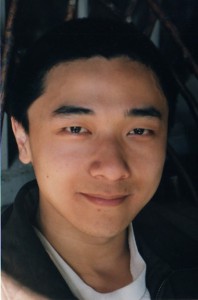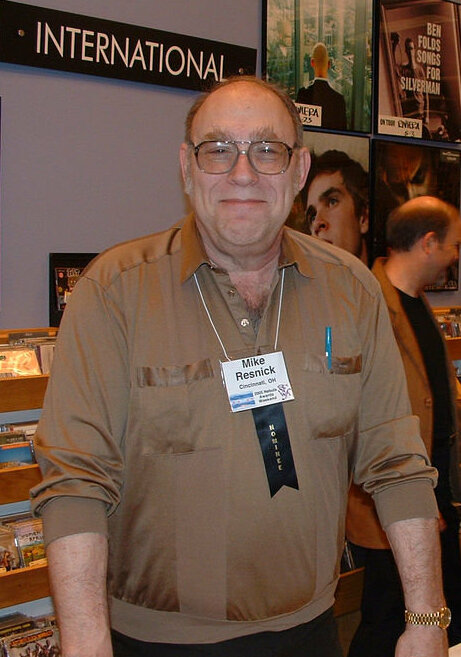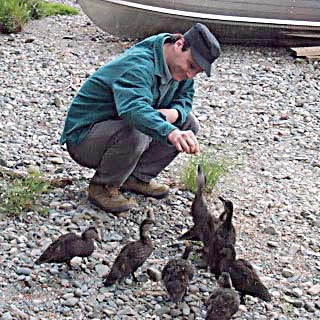written by Frank Dutkiewicz
Hey there fans of Daily Science Fiction. Have you’ve been enjoying all the free works of speculative fiction all these years? If you have, maybe you can show the editors some love. First, here are this month’s stories†�
Stories about or containing affairs as plot are fairly common, yet “Persephone at Arm’s Length” by Bridget A. Natale (debut 5/1 and reviewed by Dustin Adams) stands out because of how polar opposite the two characters are.
The protagonist puts up with more than any man rightly should (which is deftly “shown” not “told” by the author). And she is solely in need of companionship while her husband is away(Where he is gives this tale quite a boost).
There’s a distinctly lopsided relationship here, even for two people married to others, and I gather that it’s not likely to change.
“Lyam” by Jez Patterson (debut 5/2 and reviewed by Dustin Adams) is a fun, flash piece about human parents struggling to come to grips with their adopted baby. Their alien baby.
The father is on board, ready to go, and soothes his wife with humor and love, but she — she’s not so sure. Decent story. Simple, and enjoyable.
“Things We Leave Behind” by Alex Shvartsman (debut 5/ 3 and reviewed by Dustin Adams) is a story about a Russian couple and their son leaving their country, town, and legacy, not so much to find a better life but to escape a not-so-great one. Fueled by the matriarch and with the young son eager to explore, the father eventually acquiesces and parcels their belongings, including his vast collection of books. The books that have kept their town safe for generations.
Personally, I enjoyed this story very much. There’s subtle hints of magic here and the timing of world events leads the reader to believe they are absolutely true.
“The Taking Tree” by Emily C. Skaftun (debut 5/6 and reviewed by Dustin Adams) according to the author’s notes was inversely inspired by The Giving Tree by Shel Silverstein. While I can certainly see the author’s motivation I admit I was disappointed to discover this fact because I quite enjoyed the story as-is.
A tree, having been cut down by a life-long friend, grows anew around the stump with rings of saplings that together become the mightiest tree in the forest. Sadly, however, the tree’s thoughts are bitter and when other children come to play she doesn’t trust them; she hurts them.
“Smaug, MD” by Andrew Kaye (debut 5/7 and reviewed by Dustin Adams) is a brilliant story in which dragons have returned to the Earth but are small enough to become our physicians. They’re better at doctoring than their human counterparts, and have set up complex insurance programs which culminate in the consumption of the patient at the time of death.
However, the narrator’s father is let in on a secret mere moments before he is to be eaten that shakes his foundation, and that of his daughter. What did the dragon tell him?
Unfortunately, I found myself so interested in what the revelation was, that the story itself, the journey, lost some of its luster. Good stories start with a question that’s answered at the end, and this one was great. Possibly too great.
“Puss” by Melissa Mead (debut 5/8 and reviewed by Frank D). The famous fairy tale cat readies himself for the next chapter in his life, and takes a previous rival as a convenient companion.
In this alternate fairy tale, Puss has had enough , electing to strike out on his own. It isn’t clear to me if this is an unwritten epilogue of the old classic, or a divergence in the original story.
Peter Whitt stands accused of the most heinous of crimes, the attempted assassination of the angel. In “Ichor” by Jess Hyslop (debut 5/9 and reviewed by Jim Hanzelka) he shows no emotion as the charges and sentence of death is read. He stares straight ahead not looking at the priest as he rolls up the scroll. He doesn’t react as the executioner strides to the handle, doesn’t acknowledge the jeers and thrown dirt clods from the crowd. Only when he falls through the trap door does he react. He smiles. It is as if he knows something no one else does.
This is an interesting story. I can’t say I really cared for the layered flashback structure the author uses to tell the tale, but still the sense of the story comes through. The author does a pretty good job of setting and character development for a short work and the ending works well. Overall an interesting read, if not one of my favorites.
The princess withers under the overbearing hand of her father in “The Princess and Her Tale” by Mari Ness (debut 5/9 and reviewed by Jim Hanzelka). She is aware of her value only as a princess, but her father sees her as the reincarnation of her mother and seeks to hold her unmarried at his side. The minister concocts a plan to free the princess. She adopts a disguise and with her maid leaves the city. Along the road they meet three women who give them gifts to aid in their goal to have the princess meet and marry a princess from another land.
The author has crafted a well written tale that flows well for the most part. The problem is it seemed a little too familiar and in the end just wasn’t interesting enough to hold my attention. The story also seemed cramped in this format with not enough space to allow the spectacle to flourish or the tale to unfold gently. Overall not a story I would recommend, unless you are a devotee of fairy tales, then it may be worth a read.
A medium has a special bond with her dead in “Forgiving Dead” by Jeff Stehman (debut 5/13 and reviewed by Frank D). The protagonist is visited by a pair of customers. Like many, they wish to contact a lost relative , a victim of a tragic accident.
“Forgiving Dead” is a story of condolence. The protagonist’s gift is her own penance, a reminder of her role in the spirits of this tale’s fate. A nice, but not jarring, twist at the end. I rather liked it.
The yearly family get together would not be complete without the telling of the traditional tale in “The Troll (A Tale Told Collectively)” by Marissa Lingen (debut 5/14 and reviewed by Frank D). Telling the tale , much like the outcome of the tale , always ends in disaster.
This light-hearted look at family reunions centers around the conflicting story of a troll that had a habit of disrupting past reunions , until the day long-gone grandpa rudely put the trolls intrusion to an end. The telling of the tale is never completed but the story within the story wasn’t really the story anyway. “The Troll” is a tale of dysfunctional family dynamic and is an excellent analogy on why so many of us don’t look forward to holiday gatherings every year.
Faith powers the “Airship Hope” by Laurel Amberdine (debut 5/15 and reviewed by Frank D). The lighter-than-air ship is a vessel prophets deemed necessary. A labor of a thousand years, monks ride in search of a new land, steering through the skies on the power of prayer. Only doubt can doom the vessel. Those who lose faith, are cast aside , no matter how important they are.
“Airship Hope” is a tale of commitment. The captain of the craft is the bishop of the order. A test craft proved doubt will spread and spell the end of the vessel. Blind faith is a must. The tale has a slight twist but it isn’t the climax of this short tale. The bishop’s own faith is tested, and you can see the seeds of his own doubt sewn in the fabric of the finale.
A hard woman makes her man hard in “Puppet Man” by Cate Gardner (debut 5/16 and reviewed by Frank D). Walter is a mealy married to an overbearing woman. Maeve is a bully who is never satisfied with her husband. To combat her boredom (and to get away from Walter) she acquires a hobby , taking up woodworking at the local college. Her instructor also teaches sorcery, and Mauve is eager to combine the two talents, and experiment on Walter.
“Puppet Man” is a tragedy. Walter is a spineless man who can’t please , but never stops trying , his wife. Maeve is the worse type of spouse; judgmental, unsympathetic, rude, selfish, bossy – and with all the tenderness of a cactus. She doesn’t like her husband one bit. Walter is very unhappy with his marriage but lacks the courage to put his foot down. Maeve is out to change him once and for all.
The story is told from Walter’s perspective. The reader ends up hating Maeve and her lack of any redeeming quality whatsoever. Weak, indecisive, complicit; Walter doesn’t come off well either in the sympathy department. He internally contemplates leaving Maeve but outwardly endures her masochistic actions. “Puppet Man” attempts a twist but twist fails to turn the story. The changes Maeve imposes on Walter does nothing to change him or his mind. Instead, it only serves as another pin for Maeve to poke her man with.
An extrinsic cybernetic man buys “The Last Tiger” by Joanne Anderton (debut 5/17 and reviewed by Frank D). Edward is a wealthy man. He fills his home with replicas of extinct animals. The Last Tiger is his most unique possession , a creature that is mostly alive. Its brain and heart are cybernetic units – such are the limitations of biological components – but the creature smells, defecates, and acts like the predator it once was. The living creature requires a lot of care but there is something alluring to it. Edward is drawn to its primeval need to hunt, as if its desire to kill is what makes it seem so alive.
“The Last Tiger” is a tale of decay. Earth has become a sterilized world where the electronic has merged with the biological. Society, the landscape, and personalities mimic what once was. The tiger in this tale acts like an overgrown house cat for Edward, seeking his owner’s affections and bringing his fresh kills for Edward as ‘gifts’. The large creature drives a wedge between Edward and his wife, and between Edward and his reality. So fascinated he is with his pet that he forgoes the basics of substance for himself. The story at this point changes. What was set up as a metaphor on our decaying society becomes a diverting Trojan Horse finale.
I found this story to be well-conceived. The people of this future are barely people anymore and I got the impression that civilization was operating on an auto-pilot. Biomechanical humanity has become a sterilized society; a mimic of what we once were. This portion of the premise attracted me. However, the payoff I was expecting never came when a twist took the story in a direction I wasn’t expecting and into a conclusion I didn’t fully understand. Let me just say the disguised antagonist’s motives I don’t get. It left me scratching my head and wondering ‘why?’
“Private Memories” by Michael Haynes (debut 5/20 and reviewed by Jim Hanzelka).
The main character can control time and is using this ability to prevent Sara from killing herself. Over and over again he tries to change the events, failing each time. Five, six, seven tries are not enough. Finally he succeeds, finds the right words to pull her back. But someday the time will come when even this ability isn’t enough, and the fates will have their due.
This story has an interesting premise. If you had the ability to go back in time and correct some mistake, should you; or are you doomed to eventually pay the price. While I like the concept, I can’t really say I care for the execution in this case. The author has chosen to put this in a first person format that felt a little distant to me. I never really felt for his characters, therefore I found the piece a little flat.
The narrator is in the basement with her friend’s lover in “The Left Side of Your Lover’s Broken Face” by Brynn MacNab (debut 5/20 and reviewed by Jim Hanzelka), but they are only playing ping pong. She’s comfortable with him as a friend, maybe more so than her female friend. Their discussion ranges from politics to cows to shoes. The lover is distracted by the conversation, which leads to an unfortunate accident with a ping pong ball. This event cascades into a darker event, one that reveals a secret that changes the narrator’s perspective on life. Eventually.
This is another oddly constructed story, but with a less interesting premise. I found the characters oddly flat and distant. Even the narrator seemed to display a lack of passion, even when fleeing for a weekend. Even odder, the author tries to portray her as terrified, but the next week she’s back acting as if the traumatic event is merely bad socialization. I found the whole story a little disjointed.
A princess seeks an escape in “A Little Sleep” by Melissa Mead (debut 5/22 and reviewed by Frank D). The protagonist is a bright daughter of a widowed king. His only surviving child, she will make an excellent bargaining chip for an endowment. She does have a choice but it is a radical one.
“A Little Sleep” is a darker side to the ‘Sleeping Beauty’ fairy tale. The princess is well aware of the curse on her head, but has managed to steer clear of spindles thus far. Her predicament, as a married off princess, is not to her liking, which makes the allure of the spindle actually enticing.
I liked Ms Mead’s addition to this tale. Logical and gives the story more meaning. The ending had an amped up dark mystery to it as well. Well done.
Family togetherness involves a “Nitpick” by K. S. O’Neill (debut 5/23 and reviewed by Frank D). The characters of this story live in a future where parasites are accepted companions.
This story’s point was lost on me. There were a lot of subplots that had no obvious connections to me. The central theme to this story is the tolerated lice that live on their human hosts. The humans have come to frown upon the serious arts , like science and math , while pushing their children to take up frivolous activities.
I hate to nitpick at “Nitpick” but I found this tale not that all fulfilling and a little bit gross.
Pest, pet, or partner? “An Exodus of Wings” by Bonnie Jo Stufflebeam (debut 5/24 and reviewed by Frank D) is the story of three people whose lives intersect from a fairy infestation in Michael’s apartment. He had always taken steps to keep them at bay but when he fell for Heidi, his attention to detail waned and the fairies soon appeared. He doesn’t dare harm them when she is around. It becomes clear that it is the fairies that draw her to his apartment and he realizes that there will be no future between the two. Time to call an exterminator.
“An Exodus” is a tale of three perspectives. The writer chose to tell each person’s tale in a different point of view (distant 3rd person, 1st person, and 2nd person), unique and accomplished well. It takes talent to pull that challenge off well , kudos to Ms. Stufflebeam. Although her story telling skills are impressive, the story itself was thin. The tale was just about a boy who was willing to live with an inconvenience to impress a girl. The fact that the inconvenience was a magical pest made the premise only slightly different. The ending left me unfulfilled.
A man strikes a deal to achieve everything in “The Bargain” by Henry Szabranski (debut 5/27 and reviewed by Frank D). The protagonist is in the midst of the final scene in a final act of a tragedy of his own creation. He had made a deal with the devil without weighing the costs.
“The Bargain” is a very short tale on greed. It is written as if it were the final page of a much longer story. What happens before is not known to the reader but it doesn’t matter with the conclusion that is left for us anyway.
A great work of flash. I can imagine plenty of readers unsatisfied with its brief telling and sharp conclusion but I liked this commentary on overpaying for your deepest desire.
Recommended.
“The Wheel of Fortune” by Alexander Lumans (debut 5/28 and reviewed by Frank D). Aliens have invaded Earth and are tearing up the ground to extract its minerals. The protagonist is a young soldier whose dreams are big and plans bigger.
This story is told with headers pertaining to cards in a Tarot deck. I don’t know of the orders of the cards or their meanings, so part of the point of this tale may have been lost on me. That aside, I could only follow about half of what the story was about. The conclusion felt as if a large section of the tale was missing. I got the nature of the interstellar conflict, but the protagonist’s inner turmoil fell out of my grasp.
Four witches are out to concoct a special thing from the “Jumbo Gumdrop Serenade” by E. Catherine Tobler (debut 5/29 and reviewed by Frank D). The thing they have been waiting for has arrived on their porch. The four brew their potion, speak their spell, dance their dance, in hopes of creating something greater than themselves. What they get is a something so different from what they are.
“Jumbo Gumdrop” is a tale I had to read twice, and read slowly to grasp what it was about. A big mystery is kept from the reader as the author dangles encrypted hints. The effort of deciphering it was laborious. The ending did have an appropriate twist that made reading the story worth it.
A ghost baby cries relentlessly in “Ghosts in the Walls” by Shannon Peavey (debut 5/30 and reviewed by Frank D). The spirit of a baby in Laura’s apartment wall is a wailer. It cries until an earthquake comes then is silent as if it is rocked asleep. Its screams are wearing on Laura nerves but she is compelled to endure them.
The protagonist in “Ghosts” is a woman racked with guilt. She is in the midst of a divorce. Her child was lost in a crib death months ago. Earthquakes plague the city but leave her building unharmed. Any or all of these occurrences may be the reason why the baby in her wall screams but the reader and protagonist are clueless why. The story does have a straightforward conclusion, which likely was the reason why I never saw it coming. It was hidden in plain sight along.
“Ghosts in the Walls” is a very good ghost story. Short, sweet, and little sad. Everything a ghost story should be.
Recommended.
A political pundit lives on with the help from “The Suit” by Robert Reed (debut 5/31 and reviewed by Frank D). Garrett is a writer on matters of public policy. His articles are popular and his Sunday appearances on news programs are influential. His conservative principles hold much influence but his mental faculties take a hit after a small stroke. Ill-conceived words threaten his credibility, but a wealthy fan offers him a solution so he won’t fade from the public eye; an artificial intelligence assistant hidden in a suit.
“The Suit” is a long tale in a small package. The protagonist is a crafty man who has done well masking an average intelligence with timing and keen insight on outward appearance. His conservative opinions strike a fascist tone one day, nearly derailing him for good. A benefactor salvages his credibility and enhances his intelligence with the help of his suit. Soon, his radical notions become policy. He is a star once again, but age has its effects, ending his life. However, the suit remains, and the people closest to Garrett would love to wear it.
You cannot ignore the veiled distaste the author has for his protagonist. Although Garrett could represent one of many real life pundits, the fictional character’s beliefs really didn’t matter. The story could have been told if his views were a mirror opposite on the left. The tale was a commentary of the effects of artificial intelligence and how its benefits for a few could have disastrous effects for those who have not the means to acquire such assistance for themselves. Although the story made its ‘point’, it lacked a discernible moral I would have expected for a politically motivated piece. It was very much like the political debates on TV; thoughtful words from (a) smart sounding pundit(s) to make you believe you are learning something, but in reality resolve nothing when it ends.
A Chance to Settle a Paying Forward Debt†�
As I have stated before, a leading editor and reviewer once told me that he doubted Daily Science Fiction would have a long lifespan because of a non-existent (at least one he couldn’t see) business model. Jon Laden and Michele-Lee Barasso proved him , and many other , doubters wrong. They have managed to maintain DSF as a free distributor of speculative fiction for three years strong , and counting. At eight cents a word and publishing hundreds of thousands of words a year you don’t have to be a mathematician to know that can’t be cheap. Paying authors aside, there is the expense of maintaining and sending a story to 7000+ subscribers every work day. A friend of mine once calculated what the cost of just running the web page must be for the editors. I was floored.
So, our two founding heroes have done it without asking for a dime, but the pot they found at the end of the rainbow just might becoming a little bit light. They now could use some help.
Through Kickstarter, – an online project funder , DSF is asking its long standing members for a small donation. The amount they are asking for I don’t think will fund a month’s worth of stories, but it is all they are requesting. If every subscriber donated $1, they would meet their goals with enough left over for them to each grab a coffee or two at Starbucks. Of course, you know that guy next to you won’t give a cent (freeloader), so it’s up to you to throw in an extra buck for him.
Note: At the time of this writing, the campaign still needs over 2 grand more to meet its goals , and has two weeks left to do it. I confess, I am bit surprised they didn’t reach the very modest target in the first few days. So be a champ, and give.
Editor’s note: at the time of scheduling this post, the campaign needs about $700 in 7 days. Deadline is August 16–4 days from when this post becomes public.
 The Lord of the Underworld and all the damned souls in his realm would like to thank Diabolical Plots contributor Dustin Adams for achieving another sale , thus saving them a costly air conditioning bill for this month. His latest work will soon be appearing in an upcoming issue of Plasma Frequency. Congrats Dustin. And here I was worried it would take another million words for you to get published again.
The Lord of the Underworld and all the damned souls in his realm would like to thank Diabolical Plots contributor Dustin Adams for achieving another sale , thus saving them a costly air conditioning bill for this month. His latest work will soon be appearing in an upcoming issue of Plasma Frequency. Congrats Dustin. And here I was worried it would take another million words for you to get published again.




 Mike Resnick recently launched 2 new projects.
Mike Resnick recently launched 2 new projects.  (I’ve done my best to keep this spoiler-free as long as you’ve read the previous 13 books)
(I’ve done my best to keep this spoiler-free as long as you’ve read the previous 13 books) Karl Bunker
Karl Bunker
